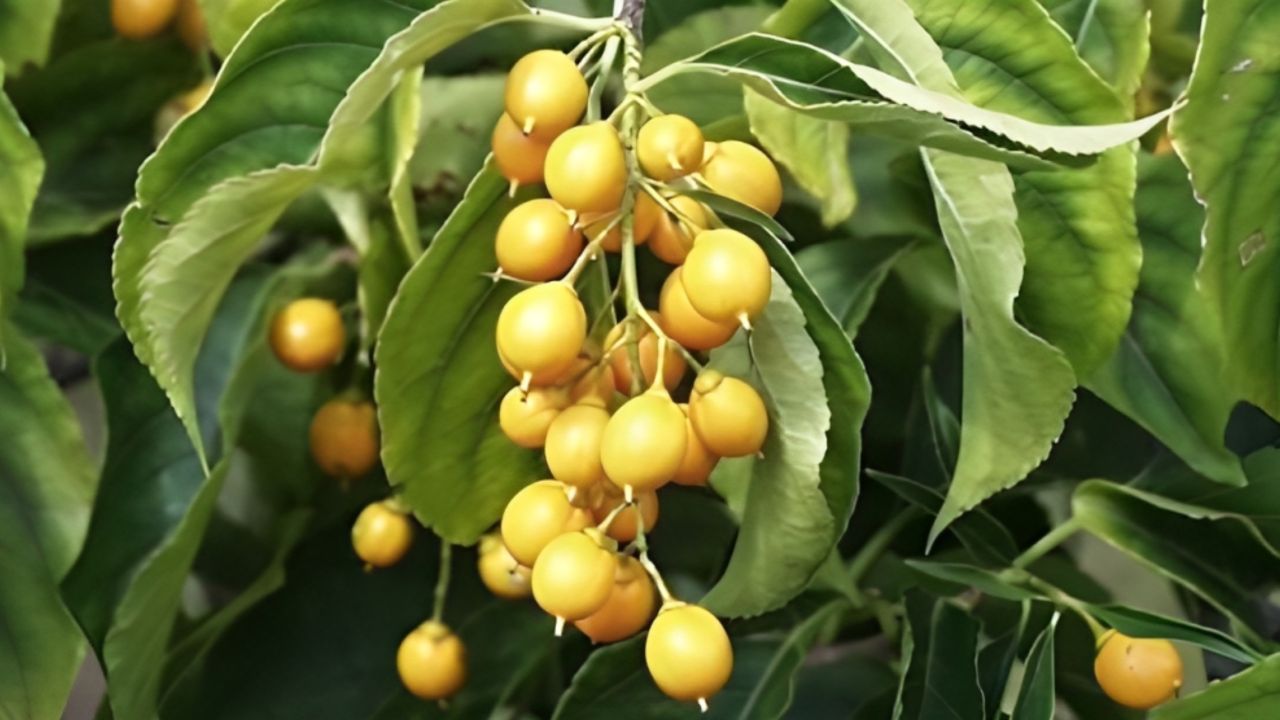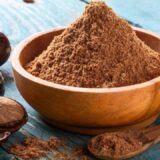Malkangani: Benefits, Uses, Side Effects – A Complete Guide
Malkangani, scientifically known as Celastrus paniculatus Willd, is a botanical treasure deeply rooted in the history of Ayurvedic medicine. This remarkable herb, native to the Indian subcontinent, has been celebrated for centuries for its potential to enhance cognitive function, alleviate various health conditions, and promote overall well-being. 
With its diverse range of applications, Malkangani has garnered attention not only for its versatility but also for its traditional significance. In this article, we will delve into the world of Malkangani, exploring its origins, nutritional profile, therapeutic uses, and how to incorporate it into your wellness routine. Join us on a journey to unlock the secrets of this extraordinary herb and discover the wealth of benefits it may offer.
Malkangani In Ayurveda
In Ayurveda, Malkangani is regarded as a warming herb known for its potential to alleviate Kapha and Vata doshas, two of the three primary constitutions or body types in Ayurvedic medicine. However, it’s important to note that Unani practitioners caution against administering this herb in high doses.
Especially in warm climates and to young individuals, as it has a heating effect on the body. Interestingly, in certain regions of India, Malkangani is applied topically to provide warmth during the winter months.
It’s essential to be aware that the Malkangani plant is associated with antifertility effects and is considered an abortifacient, meaning it may induce abortion. Therefore, it should be used with extreme caution, particularly by pregnant women. Additionally, high dosages of Malkangani can lead to side effects.
Before using Malkangani in any form, it is strongly recommended to consult with an experienced Ayurvedic doctor who can provide personalized guidance, determine the appropriate dosage, and assess its suitability for your specific health needs and constitution. This precaution ensures safe and responsible usage of Malkangani in accordance with Ayurvedic principles.
Ayurvedic Properties of Malkangani
In Ayurveda, Malkangani, scientifically known as Celastrus paniculatus Willd, is recognized for its unique properties, tastes, and effects on the body. These Ayurvedic properties are essential in understanding how Malkangani can be used for various health purposes:
1. Rasa (Taste): Malkangani is primarily classified as having a bitter (tikta) taste, which is one of the six tastes described in Ayurveda.
2. Guna (Quality): It is considered to have light (laghu) and sharp (tikshna) qualities, indicating its subtle and penetrating nature.
3. Virya (Potency): Malkangani is recognized for its hot (ushna) potency, which means it can generate heat in the body.
4. Vipaka (Post-digestive Effect): Its post-digestive effect is pungent (katu), meaning it can leave a spicy taste after digestion.
5. Dosha Effect: According to Ayurveda, Malkangani is believed to primarily balance the Vata dosha while potentially increasing the Pitta dosha. This means it can have a calming effect on Vata imbalances while being used cautiously in individuals with Pitta dominance.
6. Actions: Malkangani is associated with various actions, including nervine tonic (strengthens the nervous system), brain tonic (benefits cognitive function), and digestive stimulant (enhances digestion).
Nutritional Value of Malkangani
The cold-pressed oil obtained from the seeds of Malkangani is rich in nutrients, making it a valuable addition to your dietary and wellness regimen. Here is a breakdown of the nutritional components found in Malkangani oil:
1. Carbohydrates, Sterols, and Polyhydric Alcohols: Malkangani oil contains carbohydrates, sterols, and polyhydric alcohols, which are essential for various bodily functions. Carbohydrates provide energy, while sterols and polyhydric alcohols play a role in maintaining cell structure and function.
2. Monounsaturated, Polyunsaturated, and Saturated Fats: The oil is a source of different types of fats, including monounsaturated, polyunsaturated, and saturated fats. These fats are crucial for overall health, with monounsaturated and polyunsaturated fats being heart-healthy options.
3. Vitamin C: Malkangani oil contains vitamin C, an antioxidant that helps protect cells from oxidative damage. Vitamin C is also essential for collagen production, which is important for skin health.
4. Minerals: This oil is a rich source of minerals such as sodium, calcium, potassium, and iron. These minerals are vital for various physiological processes, including maintaining electrolyte balance, bone health, and oxygen transport in the blood.
5. Triterpenoids, Tri-terpenoid Phenolic Compounds, Sesquiterpenes Polyol Esters, Tannins, and Saponins: Malkangani oil is packed with bioactive compounds like triterpenoids, tri-terpenoid phenolic compounds, sesquiterpenes polyol esters, tannins, and saponins. These compounds have various health-promoting properties, including anti-inflammatory and antioxidant effects.
Therapeutic Uses of Malkangani
Malkangani, scientifically known as Celastrus paniculatus Willd, has been employed in traditional medicine for a wide array of therapeutic purposes. Here are some of the notable therapeutic uses of Malkangani:
1. Fistula Treatment: Malkangani is utilized in the treatment of fistula, a painful condition characterized by abnormal connections between body cavities or organs.
2. Cold Diseases: It has been employed to address cold-related ailments such as hemiplegia (paralysis of one side of the body) and facial palsy.
3. Urine Retention: Malkangani may be used to relieve urine retention, a condition where the bladder cannot empty fully.
4. Lethargy and Stamina: This herb is known for its potential to combat lethargy and enhance stamina, making it beneficial for those seeking increased energy levels.
5. Gastrointestinal Health: Malkangani is employed to alleviate various stomach problems, potentially offering relief from digestive discomfort.
6. Sexual Health: It has been traditionally used to address sexual problems, although scientific evidence in this regard is limited.
7. Muscle Spasms and Arthritis: Malkangani’s anti-spasmodic properties make it valuable in managing conditions like spasm and arthritis.
8. Neurological Conditions: This herb is used in the treatment of neurological conditions such as facial paralysis, amnesia (memory loss), and nervous problems.
9. Respiratory Health: It is traditionally employed to alleviate chest pain, asthma, pneumonia, and other respiratory issues.
10. Joint Pain and Gout: Malkangani may offer relief from joint pain conditions like hip pain and gout.
11. Mental Health Enhancement: The oil obtained from Malkangani seeds, when mixed with clarified butter made from cow’s milk, is believed to boost mental performance.
12. Cognitive Enhancement: The powder derived from Malkangani’s fruits, seeds, and flowers is used to enhance intelligence and address mental problems.
13. Nervous System Support: Powder obtained from the seeds of Malkangani is utilized to treat nervous problems.
14. Anti-Anxiety and Anti-Convulsant: Malkangani seed oil is considered to have anti-anxiety and anti-convulsant properties, which can help manage conditions characterized by anxiety and seizures.
15. Sleep Aid: It is employed as a sleep-inducing agent, potentially assisting those with sleep disorders.
16. Antioxidant Properties: The seed oil is recognized for its antioxidant properties, which can help combat oxidative stress in the body.
17. Headache and Depression Management: Seed essence from Malkangani is used to manage headache, severe depression, and excessive sleepiness.
Special Medicines Made with Malkangani
Malkangani, scientifically known as Celastrus paniculatus Willd, is a versatile herb that plays a crucial role in Ayurvedic medicine. It is used in various formulations and medicines for specific health purposes. Here are some special medicines and formulations that include Jyotishmati:
1. Malkangani Oil: Jyotishmati oil is used in the treatment of leucoderma, a skin disorder characterized by white patches. It is applied topically to affected areas to promote skin health and pigmentation.
2. Smriti Sagar Ras: This Ayurvedic formulation is formulated to improve memory and concentration, especially in elderly individuals. It is known for its cognitive-enhancing properties and is used to support cognitive function.
3. Hartone Capsules: Hartone capsules are recognized as a cardiac tonic. They are formulated to support heart health and may aid in maintaining cardiovascular well-being.
Note: These medicines and formulations demonstrate the diverse applications of Jyotishmati in Ayurvedic medicine. However, it’s crucial to use these products under the guidance of a qualified Ayurveda practitioner or healthcare professional.
Benefits of Malkangani
One of the primary reasons Malkangani has gained popularity is its potential to enhance cognitive function. It is believed to work by increasing blood flow to the brain, which can lead to improved concentration, memory, and mental clarity.
Whether you’re a student looking to excel in exams or a professional aiming to boost productivity, Malkangani could be the natural solution you’ve been seeking.
1. Stress Reduction
In today’s fast-paced world, stress has become a common companion. Malkangani offers a natural way to combat stress and anxiety.
It contains compounds that may help regulate cortisol levels, reducing the body’s stress response. Incorporating Malkangani into your daily routine might help you find a sense of calm amidst life’s chaos.
2. Immune System Support
Maintaining a strong immune system is crucial for overall health. Malkangani possesses immunomodulatory properties that can bolster your body’s defenses against infections and illnesses.
By incorporating this herb into your wellness regimen, you may experience fewer sick days and greater vitality.
3. Skin and Hair Benefits
Malkangani’s benefits extend beyond the realm of cognitive health. It is also known for its potential to improve skin and hair health.
Its antioxidant properties can combat free radicals, which contribute to premature aging. Additionally, it may promote hair growth and reduce hair loss, leaving you with radiant skin and lustrous locks.
How to Use Malkangani
Incorporating Malkangani, or Celastrus paniculatus Willd, into your routine can be done in several ways, each offering its own potential benefits. Here are some common methods for using Malkangani:
1. Malkangani Seed Oil: The oil obtained from cold-pressing Malkangani seeds is a versatile option. You can use it in cooking, similar to other cooking oils. Additionally, you can apply Malkangani seed oil topically to promote skin and hair health.
2. Malkangani Powder: A powder can be prepared by grinding Malkangani flowers, fruits, and seeds together. This powder can be consumed directly or added to various dishes and beverages for a nutritional boost. It’s a convenient way to incorporate Malkangani into your diet.
3. Malkangani Leaf Juice: The juice extracted from Malkangani leaves is another way to harness its potential benefits. You can consume it as a standalone beverage or mix it with other juices for a refreshing and nutritious drink.
4. Malkangani Seed Essence: Malkangani seed essence, often in the form of an extract, can be used for therapeutic purposes. It may be taken orally, following recommended dosages and guidelines, especially for addressing specific health concerns.
5. Whole Malkangani Seeds: Incorporating whole Malkangani seeds into your diet is another option. They can be used in various culinary preparations, added to salads, or even ground and mixed with other ingredients to create nutritious snacks.
Side Effects and Precautions of Malkangani
While Malkangani (Celastrus paniculatus Willd) is known for its potential therapeutic benefits, it’s essential to be aware of possible side effects and take necessary precautions when using this natural remedy. Here are some important considerations:
1. Allergic Reactions: Some individuals may be sensitive or allergic to Malkangani or its components. If you experience symptoms such as itching, skin rashes, swelling, or difficulty breathing after using Malkangani, discontinue use immediately and seek medical attention.
2. Dosage: Malkangani should be used in moderation and according to recommended dosages. Excessive consumption may lead to digestive discomfort, diarrhea, or other adverse effects.
3. Interactions with Medications: If you are taking prescription medications, consult with a healthcare professional before using Malkangani, especially in concentrated forms like extracts or supplements. There is a potential for interactions that could affect the efficacy of your medications.
4. Pregnancy and Nursing: Pregnant and nursing women should exercise caution when considering the use of Malkangani. There is limited information available about its safety during pregnancy and lactation, so it’s advisable to consult with a healthcare provider before use.
5. Children: Malkangani is not recommended for use in children without guidance from a healthcare professional. Ensure that any usage is age-appropriate and follows professional recommendations.
6. Pre-Existing Medical Conditions: If you have underlying medical conditions such as liver or kidney disease, gastrointestinal disorders, or neurological issues, consult with a healthcare provider before using Malkangani. It may interact with these conditions or affect their management.
7. Quality and Source: Ensure that you obtain Malkangani products from reputable sources. Quality and purity can vary between brands, so choose products that adhere to safety and quality standards.
8. Topical Application: When using Malkangani oil topically, perform a patch test first to check for skin sensitivity or allergies. Dilute the oil with a carrier oil if necessary, and avoid contact with the eyes and sensitive mucous membranes.
9. Monitor for Adverse Effects: If you decide to incorporate Malkangani into your routine, be attentive to any adverse effects. If you experience unusual symptoms or discomfort, discontinue use and consult a healthcare professional.
Side Effects of Using Malkangani Oil
Malkangani oil, derived from the seeds of Celastrus paniculatus Willd, can offer several health benefits. However, it’s crucial to approach its use with caution, especially if you have a Pitta-dominant constitution in Ayurveda. Here are potential side effects and precautions to consider:
1. Restlessness: In some individuals with a Pitta constitution, the use of Malkangani oil may lead to restlessness or heightened agitation. It’s important to monitor your response and discontinue use if such symptoms occur.
2. Dizziness: Malkangani oil may cause dizziness, particularly in those with a Pitta imbalance. If you experience dizziness after using it, cease use immediately and consult an Ayurveda doctor.
3. Burning Sensation: Some individuals may experience a burning sensation, especially when Malkangani oil is applied topically. Ensure that it is properly diluted if used on the skin.
4. Excessive Sweating: Malkangani oil can induce excessive sweating in some people, which may be uncomfortable. Pay attention to how your body responds and adjust usage accordingly.
5. Miscarriage: Pregnant women, particularly those with a Pitta constitution, should avoid using Malkangani oil. It is believed to have the potential to induce miscarriage, making it unsuitable during pregnancy.
6. Acid Reflux: Malkangani oil may exacerbate acid reflux or heartburn in some individuals. If you have a history of acid-related issues, consult with a healthcare professional before use.
7. Avoid If Trying to Conceive: If you are actively trying to conceive, it is advisable to avoid the use of Malkangani oil, as it may have effects on reproductive health.
8. Menstruation: It is recommended not to use Malkangani oil during menstruation, as it may have an impact on hormonal balance and could potentially worsen menstrual symptoms.
Dosage of Malkangani
The appropriate dosage of Malkangani, whether in the form of oil (taila) or powder (curna), can vary based on individual factors and specific health concerns. Here are the general dosage guidelines for Malkangani:
Malkangani Oil (Taila): The recommended dosage of Malkangani oil typically ranges from 5 to 15 drops. However, it’s essential to consult with an Ayurveda practitioner or healthcare professional for precise dosing based on your needs and constitution.
Malkangani Powder (Curna): The suggested dosage for Malkangani powder is generally 1 to 2 grams. As with the oil, it’s advisable to seek guidance from an Ayurveda expert to determine the most appropriate dosage for your specific health goals and constitution.
Note: These dosages serve as general guidelines, and individual responses to Malkangani can vary. Factors such as age, body type (Prakriti), and the nature of the health concern should be considered when determining the correct dosage.
To ensure safe and effective use of Malkangani, it is strongly recommended to consult with an Ayurveda practitioner who can provide personalized recommendations tailored to your unique needs.
Frequently Asked Questions (FAQs) About Malkangani
1. What is Malkangani, and where does it come from?
Malkangani, scientifically known as Celastrus paniculatus Willd, is a herbaceous plant native to the Indian subcontinent. It is valued for its potential health benefits, particularly its impact on cognitive function.
2. How is Malkangani typically used?
Malkangani can be used in various forms, including seed oil, powdered form, leaf juice, and seed essence. It can be ingested, applied topically, or used as a supplement, depending on the intended purpose.
3. Is Malkangani safe for everyone to use?
While Malkangani is generally considered safe when used in moderation, it may not be suitable for everyone. Pregnant and nursing women, children, and individuals with certain medical conditions should exercise caution and seek professional advice before use.
4. What are the potential benefits of Malkangani?
Malkangani is believed to offer various potential benefits, including cognitive enhancement, stress reduction, immune system support, and relief from conditions like arthritis and respiratory issues. However, scientific research is ongoing to fully validate these claims.
5. Are there any known side effects of Malkangani?
Some individuals may experience side effects, including digestive discomfort, allergies, or interactions with medications. It’s important to follow recommended dosages and consult with a healthcare professional if you have concerns.
6. Can Malkangani be used as a substitute for prescribed medications?
No, Malkangani should not replace prescribed medications for serious medical conditions. It can be considered as a complementary or alternative therapy, but always consult with a healthcare provider for medical concerns.
7. Where can I find high-quality Malkangani products?
Reputable brands of Malkangani products can be found online or at local health food stores. Ensure the product is standardized for quality and purity.
8. How long does it take to experience the cognitive benefits of Malkangani?
Results may vary from person to person. Some users report improvements within a few weeks of consistent use, but it’s important to manage expectations and use them as part of a holistic approach to wellness.
9. Can I use Malkangani for skin and hair care?
Yes, Malkangani is known for its potential benefits for skin and hair health. It can be applied topically as an oil or included in skincare and haircare formulations.
10. Is there ongoing research on Malkangani’s health benefits?
Yes, scientific research on Malkangani is ongoing, with studies aimed at understanding its potential therapeutic properties and safety profile. Keep an eye on emerging research for the latest findings.
Malkangani, or Celastrus paniculatus Willd, is a versatile herbal remedy with a wide range of potential health benefits. From enhancing cognitive function to reducing stress and supporting the immune system, this plant has much to offer. However, it’s crucial to approach its use with caution and under professional guidance.
References:
- Evaluation of immunomodulatory activity of petroleum ether extract of seeds of Celastrus paniculatus(1)
- Hypolipidemic Effect of Celastrus paniculatus in Experimentally Induced Hypercholesterolemic Wistar Rats(2)
- In vitro antimycobiotic and antibacterial action of seed extract of Celastrus paniculatus Willd. (Jyotismati)(3)
- Determination of phytochemical, antioxidant, antimicrobial, and protein binding qualities of hydroethanolic extract of Celastrus paniculatus(4)
- Anti- inflammatory activity of Celastrus paniculatus seeds(5)
- Effect of Jyotishmati (Celastrus paniculatus) seeds in animal models of pain and inflammation(6)
- A Systematic Review on Neuro-Psychopharmacological effects of Celastrus paniculatus (Malkangani) Oil(7)
- Behavioral and Biochemical Evidences for Antidepressant-Like Activity of Celastrus Paniculatus Seed Oil in Mice(8)

























